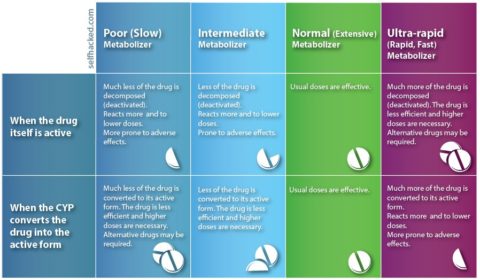
CYP2C19 is an important detox enzyme responsible for clearing approximately 10% of commonly used clinical drugs. High enzyme activity has been associated with depression. Read on to find out more about CYP2C19 function, gene variants, and factors that decrease enzyme activity.
What is CYP2C19?
CYP2C19 is one of the cytochrome P450 monooxygenases (CYPs). These are enzymes that eliminate most of the drugs and toxins from the human body [1].
This enzyme is responsible for processing more than 25 clinically important drug groups. It clears about 10% of commonly used clinical drugs that undergo Phase I detoxification [2].
Function
This enzyme metabolizes:
- Antidepressants: citalopram, escitalopram [3, 4], amitriptyline [5], and sertraline [3]
- Proton pump inhibitors: omeprazole [6]
- Anticonvulsants: mephenytoin [6]
- Diazepam [6]
- Methadone [2]
- Antimalarial proguanil [6]
- Anticoagulant warfarin [6]
- Antiplatelet clopidogrel (Plavix) [7]
- Antifungal voriconazole [8]
- MDMA (ecstasy) [9]
This enzyme is found in the liver. However, it is also active in the fetal brain, with a possible role in brain development [5].
Beneficial Effects
This enzyme participates in converting arachidonic acid to epoxyeicosatrienoic acids (EETs). EETs have beneficial effects on the heart and blood vessels.
Low enzyme activity was associated with heart disease in a study of 162 subjects [10].
Detrimental Effects
High CYP2C19 activity was associated with depression and smaller hippocampus volume in a study of 1418 volunteers [11].
A study of 1472 subjects in Sweden showed that people with high enzyme activity (CYP2C191 carriers) were more likely to be diagnosed with depression than those with defective enzyme function (CYP2C192 carriers) [12].
CYP2C19 deficiency was associated with a lower prevalence of major depressive disorder and lower depression severity in a study of 3848 African-Americans [11].
Among 209 people with depression who had attempted suicide, those with high enzyme activity showed higher suicidality [11].
Mice with high enzyme activity have impaired serotonin and BDNF production in the hippocampus [11].
Gene Polymorphism
There are more than 30 known CYP2C19 variants [6, 3].
Based on the variants they carry, individuals can be categorized as:
- ultrarapid metabolizers (*1 /*17 or *17 /*17)
- extensive metabolizers (*1/*1)
- intermediate metabolizers (*1 /*2, *1 /*3, or *2 /*17)
- poor metabolizers (*2 /*2 or *2 /*3) [13]
CYP2C19 poor metabolizers (low enzyme activity) have an increased risk of heart disease, correlated with an increase in the circulating levels of CRP in women (162 subjects) [10].
Poor metabolizers have an increased risk of side effects associated with CYP2C19-metabolized drugs like sertraline [3].
On the other hand, ultrarapid metabolizers have an increased risk of being refractory (resistant) to proton pump inhibitor (PPI) therapy (meta-analysis, 19 studies) [14].
rs4244285
rs424485 is also known as CYP2C19*2. This variant (A) reduces enzyme function [6].
It is present in 15% of Whites and Africans, and 29-35% of Asians [13]. The highest frequency of 61% is found in Native populations from Oceania [15].
Plavix (clopidogrel) is less effective in people with this variant. Therefore, they are at higher risk of developing heart damage (559 and 523 patients) [7, 16].
- RS4986893
rs4986893 is also known as CYP2C19*3. This variant (A) reduces enzyme function [6].
This variant is typically only found in Asians (2-9%) [13, 15].
Plavix (clopidogrel) is less effective in people with this variant. They are at higher risk of developing heart damage (559 subjects) [7].
- RS12248560
rs12248560 is also known as the CYP2C19*17 variant. The T in this position increases enzyme function [6].
The frequency of this variant ranges from 3-21% [13]. It is more frequent in Mediterranean-South Europeans and Middle Easterns [15], and less frequent among Asians [17].
Adults with CYP2C19*17 more often have decreased blood voriconazole levels in therapy (70 patients) [8].
This variant protects against recurrent heart damage. People with this variant have greater therapeutic responsiveness to Plavix (clopidogrel) but they have an increased risk of developing bleeding (meta-analysis, 11 studies) [18].
- rs1074145
- rs12767583
- rs17878459
- rs17879685
- rs1853207
- rs28399504
- rs3758581
- rs3814637
- rs41291556
- rs4917623
- rs4986894
- rs6583954
Decreasing CYP2C19
The following factors were found to decrease CYP2C9 activity in laboratory or clinical settings. We recommend against taking supplements or making lifestyle changes to affect CYP2C9 activity. Talk to your doctor before making any significant changes to your diet, lifestyle, or supplement regimen.


